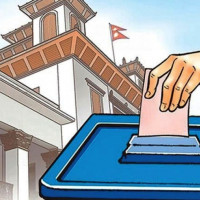- Tuesday, 3 March 2026
Strengthen Federalism For Effective Service Delivery
For all its teething problems, the federal system is gaining ground in Nepal. The country adopted a federal setup with the promulgation of a new constitution in 2015, which converted Nepal into a republican and secular state. Under federal design, the country has three layers of governance arrangements: federal, provincial, and local. It has seven provinces and 753 local bodies. Nepal has embraced cooperative federalism based on self-government and shared rule. Each of the three-tier governments has been granted exclusive and concurrent powers and rights, which marks a big shift in the administrative work and delivery of goods and services across the country.
Unlike the unitary system, the provinces and local levels are considered the governments at the doorsteps of people and pursue development work on their own. The federal setup promotes judicious allocation and distribution of means and resources so that it will bring visible change to the lives of people and create sustained economic growth and an inclusive society. However, it requires legal, physical, and administrative infrastructure for federal design to be functional and effective in fulfilling people's aspirations. Although the country has undergone two election cycles since the adoption of the federal system, the provinces still lack vital laws and regulations to execute their assigned tasks. This has hampered their ability to mobilise resources and run administration under their jurisdiction.
Critics have argued that federalism has been unable to meet its stated objectives as the country grapples with economic downturns, inflation, corruption, and instability. Some sections of the population have grown frustrated over the poor service delivery under the federal system. The government and political parties have challenges to overcome public disappointment that can give rise to anti-systemic elements, as we have seen recently.
Growing frustration
The people have shown a sense of despair as they are not seeing the results they have hoped from the federal system," said Kashiraj Dahal, a constitution expert. Dahal pointed out that for the system to function well, everyone in the country should accept and support the implementation of the constitution. According to him, if the government handles public issues maturely and performs better, the challenges with federalism can be minimised. "It’s also important to improve the old ways of doing things for a more efficient government."
It is a matter of irony that essential laws are not in place eight years after the national charter came into effect. The local units and provinces are understaffed and are unable to recruit personnel to improve public services. A sufficient number of employees is needed to ensure accountable and transparent performance.
However, the provinces also reel from political instability, corruption, and poor development. Experienced bureaucrats are reluctant to work in provinces, hindering governance reforms, order, and economic progress. Economic activities are slow due to inflation in the market and a recession in the stock market.
CPN-UML leader Khimlal Bhattarai has accused the government of being inefficient, which has affected the subnational entities. "The government should play a role in making the economy strong, involving people in productivity, and attracting investors for national projects. If the government doesn’t lead efficiently, it loses the people’s trust," said Bhattarai, adding that the people were unhappy with their performance. He suggests making provinces more active with the necessary laws so that they function efficiently.
Former lawmaker Radheshyam Adhikari said that it’s unfair to ask someone to run and win a race with their hands and legs tied. Adhikari suggests providing provinces with the necessary laws, autonomy, and support for their efforts to work effectively. "It’s too early to reach a conclusion about whether provinces have become failures or successes."
Delay in law enactment
Formulating essential acts and regulations is the prerequisite for consolidating federalism. So far, 107 laws have been formulated since the promulgation of the new constitution. However, a report from the State Affairs Committee reveals that the federal government has yet to draft about 60 crucial bills necessary for the effective implementation of federalism, but they are stuck in the parliament, which questions the competency of the lawmaking body.
Some bills include bills to operate and coordinate federations, provinces, and local bodies; the Province Police Act; the Provincial Civil Service Act; the Public Service Commission Act; the Forest Act; laws related to agriculture, health, youth, and sports; the Financial Act; bills related to the common rights manual for local bodies and provinces; and bills related to generating revenue and expenses.
Likewise, the Federal Parliament has to prepare some 160 other bills, according to the report. Adhikari said that the lawmaking process was too slow because political parties did not want to transfer their rights to the provinces and local governments. “Lack of political willingness is the main reason behind the inordinateness in the formulation of laws,” he added. Sometime back, teachers from across the country hit the streets in Kathmandu, protesting some provisions of the School Education Bill. Similarly, loan shark victims also staged a hunger strike near Maitighar Mandala, demanding a law against usury.
CPN-Maoist Centre leader and former lawmaker Ramnarayan Bidari said that the parliamentarians remained busy getting development projects implemented in their constituencies instead of focusing on lawmaking. “Parties have failed, the government is weak, and the working style is traditional. How can we perform better?” he questioned.
Bidari criticised the political establishment for its nexus with various interest groups. Mutual trust and institutional reform can improve the environment for better service delivery.
It is global parliamentary practice that lawmakers are primarily focused on drafting bills necessary for the handling of the affairs of the state. They engage themselves in animated discussions on the content of legislation so that it reflects the general concerns and needs of society. However, in Nepal, we have seen lawmakers lobbying for the budgets in their constituencies to secure their vote banks. This is also a reason behind the slow progress in making the law, resulting in legal and bureaucratic hassles.
Government instability
The dissolution of the House of Representatives (HoR) twice, frequent government changes in the centre and provinces, and a hung parliament have also hampered the smooth implementation of federalism in Nepal. It has become difficult for any party to muster a majority in the parliament due to the mixed electoral system. This has impelled the parties to form a coalition government, which means tough inter-party negotiations and horse-trading.
The absence of a clear majority divides executive powers among alliance members, posing challenges to effective governance. Parties must continually seek consensus, a daunting task given that political parties are sharply divided by ideologies.
The Nepal Communist Party (NCP), formed through the merger of UML and the Maoist Centre, pulled off a resounding victory in the first three-tier polls in the 2017 elections. The NCP-led government under KP Sharma Oli had a huge mandate to institutionalise the federal system, but the internal dispute led to the split of the NCP into at least four factions, which eventually caused the downfall of a strong communist government. The country missed a historic chance to put the nation on the path of stability and prosperity. The nation again plunged into instability as the judiciary came to the scene to decide the fate of the executive.
No political party gained a majority in the second general election conducted in November 2022. The third largest force, the Maoist Centre, formed the government with the backing of the NC and other fringe parties. The UML, which emerged as the second-largest party in the polls, is on the opposition bench. With the formation of a coalition government, there is a semblance of stability in the country. It has the onus to strengthen the system and live up to public expectations. It is imperative to promote a coalition culture to make the alliance successful. In order to satisfy all allies in the government, the alliance is led on a rotational basis. The frequent change of guard might affect policy consistency.
There is a need for working relations between the ruling and opposition parties to bolster the system envisaged in the constitution. The mistrust and confrontation between the key actors also weaken the political order and frustrate the masses. This is why the government and opposition crossed swords over the transitional justice process, one of the critical components of the peace process. Similarly, they need to forge consensus to enact the vital bills from the parliament. The lack of understanding and cooperation between them resulted in the delay in approving the bills related to civil service, education, and police, among others, which are key to empowering the provinces and local units.
Rise of alternative forces
After the November 20 elections, a new trend emerged as independent candidates gained popularity, cashing in on public disappointment. Candidates like Balen Sah and Harka Sankpang managed to defeat candidates from major political parties. Rabi Lamichhane-led Rastriya Swotantra Party garnered 21 seats in the Lower House, presenting itself as an alternative force in Nepali politics. What's interesting is that many young and potential political figures chose to align themselves with these new and independent parties, deserting the established ones. The support these candidates garnered is a clear indication that the voters sought a change in the country governed by the old parties.
Of late, anti-systemic forces are rearing their heads in different parts of the country. Durga Prasai’s ongoing drive to restore monarchy and the Hindu state is an open challenge to the present political system. Political parties such as the Rastriya Prajatantra Party and religious groups like the Hindu Sena and the Shiva Sena are against the republican and secular state. These developments could trigger new rounds of political conflict. According to Bidari, this situation emerged as the major parties failed to work together and faced credibility crises.
Federalism is a complex and expensive system. It requires a bloated structure, a budget, and efficient administration. Federalism by itself does not guarantee success. Until the leadership demonstrates understanding, commitment, and unity and makes dedicated efforts, it doesn't automatically meet common interests and produce tangible outcomes. The leadership needs to adhere to a democratic culture to make it functional and dynamic.
The anti-federalist voices in the streets should serve as a wake-up call for the major political parties to act decisively in implementing the constitution. The national charter has envisioned a socialism-oriented state with robust social security provisions.
With the successful implementation of federalism, the country can attain its constitutional goals. It is also necessary to accommodate those disgruntled voices within a democratic framework. There is no alternative but to work in unison for democratic consolidation and shared prosperity.
(Kafle is a journalist at The Rising Nepal.)





-square-thumb.jpg)










